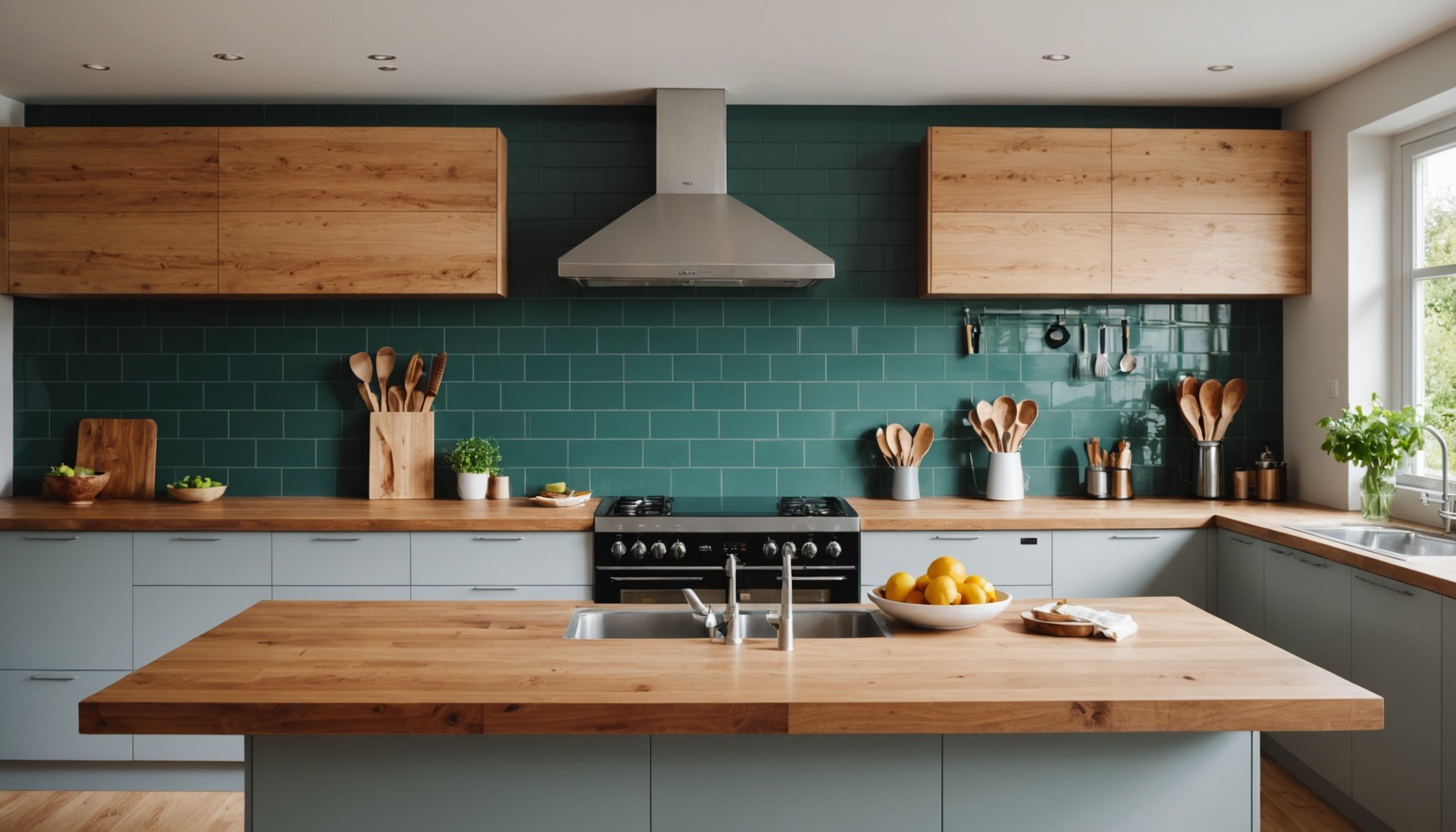Overview of Eco-Friendly Kitchen Countertop Materials
Eco-friendly countertops have transformed kitchen design, promoting environmental consciousness and style. These countertops are crafted from sustainable materials that reduce environmental impact without compromising aesthetics or functionality. Their importance extends beyond the kitchen, reflecting broader trends in architecture and lifestyle.
Sustainability in kitchen design has gained momentum as consumers become more aware of their ecological footprints. Choosing sustainable materials not only supports the planet but can also lead to healthier indoor environments by minimizing harmful chemicals. Materials like recycled glass, bamboo, and reclaimed wood are popular choices. These are sought after for their durability and low environmental impact.
A lire en complément : The best insulated water bottle with straws for every need
Key trends shaping demand for sustainable materials include increased awareness of climate change and the desire for a healthier living space. Eco-friendly countertops offer both, as they align with the principles of reduce, reuse, and recycle—making eco-conscious choices accessible to homeowners. Furthermore, innovations in material technology have made these alternatives more affordable and available, encouraging widespread adoption.
In conclusion, the intersection of style, sustainability, and function is driving the popularity of eco-friendly countertops, making them a cornerstone in contemporary kitchen design.
A lire aussi : Lustria luminary: illuminate your space with style
Popular Eco-Friendly Materials Available in the UK
The rising demand for sustainable materials in the UK has boosted the appeal of eco-friendly countertop options. These green materials provide both aesthetic value and environmental benefits, making them a popular choice for conscious consumers. Various options such as recycled glass, bamboo, and quartz offer distinct advantages and are easily accessible.
Recycled Glass Countertops
Recycled glass countertops are celebrated for their environmental benefits as they repurpose waste glass into stunning surfaces. This option is pocket-friendly, with sourcing available from numerous UK suppliers. The diverse design variations cater to any aesthetic preference, making them a versatile choice.
Bamboo Countertops
Bamboo is an eco-friendly countertop material known for its rapid renewability and minimal environmental impact. It’s sourced sustainably, ensuring low ecological disruption. Bamboo countertops require regular maintenance to retain their beauty but are extremely durable, making them a long-lasting choice.
Quartz Countertops
Quartz countertops can be found as either natural or engineered. Engineered quartz is preferred for its sustainability certifications, contributing to eco-labels. It provides exceptional durability and versatility for long-term use. Its non-porous nature ensures easy maintenance and resistance to stains, making it a practical and sustainable choice.
Comparison of Durability and Maintenance
Choosing the right countertop involves considering both durability and maintenance. Various sustainable materials offer different levels of resilience. For example, recycled glass countertops provide stunning aesthetics but require diligent material maintenance to avoid scratches. On the other hand, bamboo, while eco-friendly, can dent or warp without proper care. Understanding these distinctions is crucial in making informed decisions.
In terms of longevity, engineered stone stands out. Although it may come with a higher initial cost, its durability ensures fewer replacements over time. Consequently, the long-term financial benefits can outweigh the upfront expenses.
Maintenance requirements also vary significantly across options. For instance, countertops made from concrete demand sealing to prevent stains; however, this effort can extend their longevity. Conversely, material maintenance for stainless steel is minimal, as it’s resistant to both heat and stains.
When contemplating eco-friendly choices, the balance between cost and longevity plays a pivotal role. Materials like reclaimed wood embody sustainability but require regular oiling and can accumulate wear over time. Hence, assessing how each option aligns with your lifestyle and budget will ultimately determine the ideal choice.
Aesthetic Considerations and Design Ideas
Incorporating kitchen aesthetics into your design can transform your cooking space into a stylish haven. One popular choice is sustainable stylish countertops, which offer a blend of design ideas and functionality.
Color Options Available for Sustainable Countertops
Sustainable countertops come in a variety of colors that cater to numerous kitchen styles. Neutral tones like beige, grey, and soft white are popular, effortlessly blending with minimalist or modern themes. Warm hues such as terracotta or taupe can add rustic charm, while bolder colors like deep green or navy create striking contrasts in contemporary kitchens.
Integrating these countertops harmoniously involves considering the existing color palette. Pair natural stone or recycled glass countertops with wood elements for a warm, rustic feel. Alternatively, combine concrete with sleek metal fixtures for a modern, industrial look. Creative ways to incorporate these materials include using mixed textures and patterns, providing a unique aesthetic while maintaining eco-friendliness.
Real Kitchen Examples
Explore real kitchens that have successfully implemented these ideas for inspiration. Case studies often highlight homeowners using eco-friendly materials like bamboo or recycled composite. These examples not only provide visual inspiration but also offer practical design tips and valuable user feedback on both functionality and style. Such insights can guide you in making informed decisions for your kitchen makeover.
Installation Tips and Best Practices
Choosing between DIY installation and hiring a professional installer is an important decision when installing eco-friendly countertops. Both options come with distinct benefits and considerations. DIY enthusiasts often relish the challenge and cost savings associated with taking on a project themselves. However, professional installation ensures precision and adherence to best practices, which is especially useful for complex materials.
Key considerations during installation include ensuring that the surface is level and structurally sound. Without a stable base, even the highest quality countertops can suffer from poor performance and aesthetic issues. For those opting for the DIY path, it’s imperative to thoroughly read all instructions and material-specific guidelines.
Common pitfalls in eco-friendly countertop installation include improper sealing and mounting. Avoiding these mistakes requires understanding the unique requirements of sustainable materials, such as bamboo or recycled glass. Incorrect treatment or inadequate support can lead to premature damage or inefficiency.
Whether going the DIY route or hiring a professional, it’s essential to allocate ample time for each stage of the process. This ensures you achieve the intended benefits of your eco-friendly countertop, both aesthetically and functionally. Remember, careful planning and execution are key to a successful installation.
Certifications and Standards for Sustainable Countertops
In the quest for eco-friendly design, understanding sustainability certifications is crucial when selecting countertop materials. These certifications indicate that materials meet rigorous eco-friendly standards, ensuring minimal environmental impact.
One of the prominent certifications is the FSC (Forest Stewardship Council) for wood products, which guarantees responsible forest management. Another relevant certification is Cradle to Cradle Certified, which evaluates products across several categories, emphasizing sustainable practices and safe materials use. LEED (Leadership in Energy and Environmental Design) also plays a critical role, promoting green building strategies that foster sustainability. These certifications not only validate environmental claims but also influence consumer decisions by highlighting products that align with their values of sustainability.
Many organizations in the UK are at the forefront of promoting green building. The UK Green Building Council (UKGBC) champions the cause, working to reduce the industry’s carbon footprint and promote sustainable development practices. Their guidelines and standards support consumers and professionals in making informed choices that benefit not just individuals but the planet as well.
When choosing countertops, ensuring that they are aligned with these certifications plays a significant role in promoting wider eco-friendly standards and impacting consumer behavior positively.











